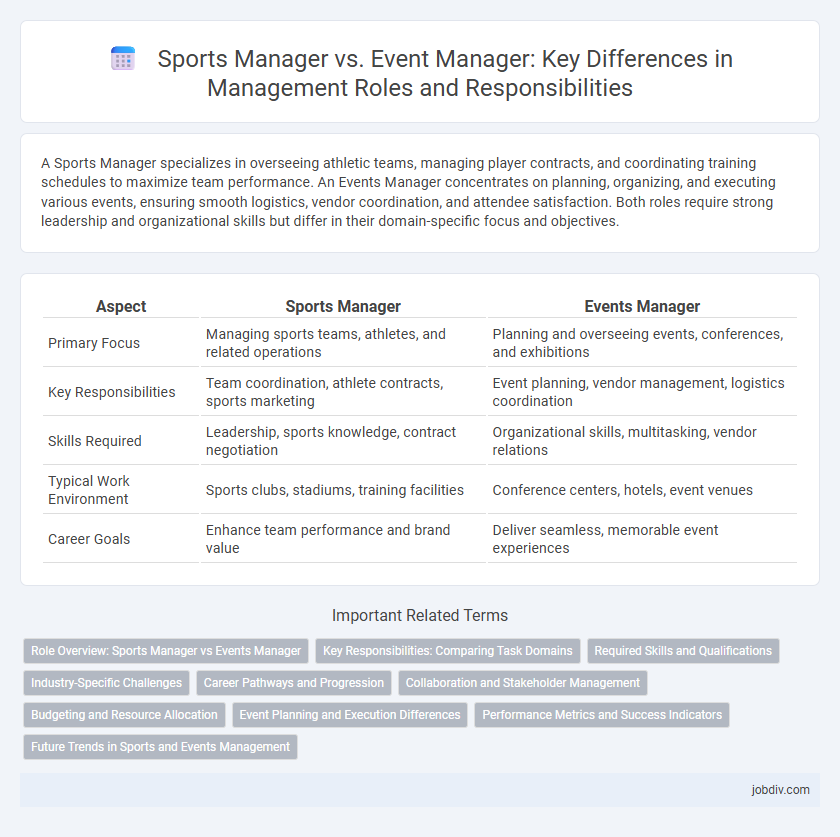A Sports Manager specializes in overseeing athletic teams, managing player contracts, and coordinating training schedules to maximize team performance. An Events Manager concentrates on planning, organizing, and executing various events, ensuring smooth logistics, vendor coordination, and attendee satisfaction. Both roles require strong leadership and organizational skills but differ in their domain-specific focus and objectives.
Table of Comparison
| Aspect | Sports Manager | Events Manager |
|---|---|---|
| Primary Focus | Managing sports teams, athletes, and related operations | Planning and overseeing events, conferences, and exhibitions |
| Key Responsibilities | Team coordination, athlete contracts, sports marketing | Event planning, vendor management, logistics coordination |
| Skills Required | Leadership, sports knowledge, contract negotiation | Organizational skills, multitasking, vendor relations |
| Typical Work Environment | Sports clubs, stadiums, training facilities | Conference centers, hotels, event venues |
| Career Goals | Enhance team performance and brand value | Deliver seamless, memorable event experiences |
Role Overview: Sports Manager vs Events Manager
A Sports Manager oversees athletic teams, coaches, and sports programs, focusing on player recruitment, training schedules, and compliance with sports regulations. An Events Manager plans, coordinates, and executes events such as concerts, conferences, and corporate gatherings, managing logistics, vendor contracts, and attendee experiences. Both roles require strong organizational and leadership skills but differ in industry focus and day-to-day responsibilities.
Key Responsibilities: Comparing Task Domains
Sports managers oversee athlete recruitment, training program development, and team logistics to optimize performance outcomes, while events managers coordinate venue selection, vendor management, and scheduling to ensure seamless execution of sports events. Sports managers focus on long-term athlete development and team strategy, whereas events managers prioritize operational details and stakeholder coordination for individual events. Both roles require strong leadership and communication skills, but task domains diverge between strategic sports oversight and tactical event planning.
Required Skills and Qualifications
Sports Managers require expertise in athlete management, sports marketing, and knowledge of regulatory compliance, often holding degrees in sports management or business administration. Events Managers must demonstrate strong organizational skills, proficiency in budgeting, and experience in event planning, typically possessing qualifications in event management or hospitality. Both roles demand excellent communication, leadership abilities, and problem-solving skills to effectively coordinate teams and stakeholders.
Industry-Specific Challenges
Sports managers face industry-specific challenges such as securing sponsorships, managing athlete contracts, and navigating regulatory compliance in competitive sports environments. Events managers encounter obstacles in coordinating logistics, managing vendor relationships, and ensuring seamless execution of large-scale public or private events. Both roles require adept problem-solving skills but differ significantly in stakeholder engagement and operational focus within their respective industries.
Career Pathways and Progression
Sports Managers often begin their careers in athletic organizations, progressing through roles such as assistant coach, team coordinator, or facility manager before advancing to director-level positions overseeing entire sports programs. Events Managers typically start as event coordinators or assistants, gaining expertise in logistics, vendor management, and budgeting, which leads to senior roles managing large-scale conferences, festivals, or corporate events. Both careers require developing strong leadership, organizational, and communication skills, with opportunities to specialize in niche areas or transition between sectors for broader professional growth.
Collaboration and Stakeholder Management
Sports Managers excel in coordinating athletes, coaches, and sports organizations to maximize team performance and fan engagement, emphasizing long-term athlete development and sponsorship alignment. Events Managers specialize in orchestrating logistics, vendor relations, and audience experience for one-time or recurring events, ensuring seamless execution and stakeholder satisfaction. Both roles require advanced communication and negotiation skills to foster collaboration among diverse stakeholders, balancing competing interests to achieve strategic objectives.
Budgeting and Resource Allocation
Sports managers allocate budgets primarily towards team facilities, athlete training programs, and equipment procurement, ensuring optimal performance outcomes. Events managers focus on detailed budgeting for venue rental, vendor contracts, and marketing efforts to deliver seamless event experiences. Efficient resource allocation in sports management centers on long-term athlete development, whereas event management prioritizes short-term logistics and operational execution.
Event Planning and Execution Differences
Sports managers specialize in coordinating athletic teams, venues, and sponsorships, emphasizing player logistics, training schedules, and competition management. Events managers focus on organizing diverse occasions, from corporate meetings to festivals, prioritizing vendor coordination, guest experience, and overall event flow. While both require strong organizational skills, sports managers align more with ongoing seasonal planning, whereas events managers handle a broad spectrum of one-time or recurring events with variable scopes.
Performance Metrics and Success Indicators
Sports Managers optimize athlete and team performance through metrics like win-loss ratios, athlete development progress, and sponsorship revenue growth. Events Managers focus on success indicators such as attendee satisfaction rates, event turnout, and budget adherence to ensure seamless execution. Both roles rely on data-driven analysis to enhance operational efficiency and achieve strategic objectives.
Future Trends in Sports and Events Management
Sports managers will increasingly leverage data analytics and artificial intelligence to optimize athlete performance and fan engagement, driving personalized experiences and operational efficiency. Events managers will prioritize hybrid event formats and immersive technologies such as virtual reality to expand audience reach and improve attendee interaction. Both roles will integrate sustainability practices and digital innovation to adapt to evolving consumer expectations and regulatory landscapes.
Sports Manager vs Events Manager Infographic

 jobdiv.com
jobdiv.com